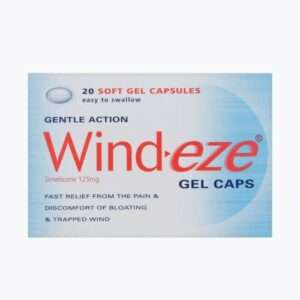Trapped wind, also known as bloating or gas, is a common condition that can cause discomfort, abdominal pain, and a feeling of fullness. While it’s usually harmless, it can be frustrating and sometimes embarrassing.
What Causes Trapped Wind?
Trapped wind occurs when gas builds up in the digestive system. This can happen for a variety of reasons, including:
- Swallowing Air
Eating or drinking too quickly, chewing gum, or using a straw can cause you to swallow excess air, which leads to trapped gas in the stomach. - Dietary Factors
Certain foods are more likely to produce gas during digestion, including:- Beans, lentils, and legumes
- Carbonated drinks
- Cruciferous vegetables like broccoli, cauliflower, and cabbage
- Onions and garlic
- Dairy products (especially if you’re lactose intolerant)
- Digestive Disorders
Conditions such as irritable bowel syndrome (IBS), coeliac disease, and small intestinal bacterial overgrowth (SIBO) can lead to increased gas production or difficulties in passing gas. - Constipation
Slow-moving stool in the digestive tract can trap gas, leading to bloating and discomfort. - Medication Side Effects
Some medications can cause trapped wind as a side effect, such as:- Antibiotics, which may disrupt the gut microbiome
- Iron supplements
- Certain painkillers, including non-steroidal anti-inflammatory drugs (NSAIDs)
- Laxatives, particularly if they cause loose stools or diarrhoea
How to Relieve Trapped Wind Naturally
If you’re experiencing trapped wind, there are several natural methods that may provide relief:
- Gentle Exercise
Physical activity can help stimulate the digestive system and encourage the movement of gas. A short walk, yoga, or light stretching can help release trapped wind. - Peppermint Tea
Peppermint has antispasmodic properties that can relax the muscles of the digestive tract, making it easier for trapped gas to pass. - Heat Therapy
Applying a warm compress or heat pack to the abdomen can soothe muscle tension and reduce discomfort caused by trapped wind. - Drink Plenty of Water
Staying hydrated aids digestion and can prevent constipation, which often contributes to trapped gas. - Adjust Your Eating Habits
- Eat slowly and chew your food thoroughly to minimise swallowing air.
- Avoid talking while eating.
- Limit your intake of carbonated drinks and gas-producing foods.
- Herbal Remedies
Fennel seeds, ginger, and chamomile tea are known for their digestive benefits and can help reduce bloating and gas.
How to Relieve Trapped Wind with Medication
For quick and effective relief, over-the-counter medications can be very helpful. These are particularly useful if lifestyle changes alone don’t resolve the issue.
- Simeticone-Based Products
Simeticone is a common ingredient in medications for trapped wind. It works by breaking down gas bubbles in the gut, making them easier to pass. At Pharmacy Advance, we offer Windeze, which contains simeticone and provides fast relief from bloating and discomfort. - Antacids
If trapped wind is accompanied by indigestion or heartburn, antacids can neutralise stomach acid and provide relief. - Lactase Supplements
For those who are lactose intolerant, lactase supplements can help break down lactose in dairy products, reducing gas production. - Charcoal Tablets
Activated charcoal can absorb excess gas in the digestive system, reducing bloating and trapped wind. - Probiotics
Probiotic supplements promote a healthy balance of gut bacteria, which can help reduce gas and bloating over time.
Tips to Prevent Trapped Wind
Preventing trapped wind can often be managed by making straightforward adjustments to your daily habits and lifestyle. Here are some tips to help:
- Reduce swallowed air: Avoid activities that increase the amount of air you swallow, such as chewing gum, drinking through straws, or talking while eating. These small habits can introduce excess air into your digestive system, contributing to bloating and discomfort.
- Monitor your diet: Keep a detailed food diary to track your meals and identify specific foods that may be causing bloating or excess gas. Common culprits include beans, lentils, onions, carbonated drinks, and certain artificial sweeteners. Once identified, you can adjust your diet accordingly to minimize these triggers.
- Adopt mindful eating habits: Eat slowly and chew your food thoroughly to aid digestion and reduce the risk of swallowing excess air. Consider having smaller, more frequent meals throughout the day rather than large portions, which can be harder for your digestive system to process.
- Stay physically active: Regular exercise, even light activities like walking, can help promote healthy digestion and reduce the build-up of trapped wind. Movement encourages your digestive system to function efficiently and prevents gas from accumulating.
When to See a Doctor
While trapped wind is usually harmless, persistent or severe symptoms may indicate an underlying condition that needs medical attention. You should consult a doctor if you experience:
- Chronic bloating or trapped wind lasting more than a few weeks
- Severe abdominal pain
- Blood in your stool
- Unexplained weight loss
- Difficulty swallowing


